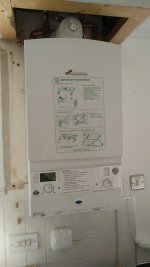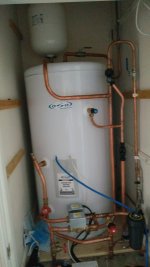Except when there's a power cut, under which circumstances an unvented cylinder merrily carries on about its business.
I've never had an acceptable electric shower.
There is the thing it's all down to personal perception! We have an electric in our second bathroom as it was easier and cheaper to fit it doesn't get used very often as most people just jump in the combi boiler fed shower in the main bathroom which is much nicer but it's very handy for those odd occasions when two people want a shower at the same time. Our Electric shower has an inbuilt pump and is fed from a cold water tank in the loft which trickle fills so it has no impact on the other shower which to me made it perfect for an occasional use.





 . But with a full tank of hot water you can carrying on showering in the event of a power cut with an unvented system, was my point. Mentioning that combi showers need electricity when I'm comparing combi / electric showers to unvented hardly seems relevant.
. But with a full tank of hot water you can carrying on showering in the event of a power cut with an unvented system, was my point. Mentioning that combi showers need electricity when I'm comparing combi / electric showers to unvented hardly seems relevant.